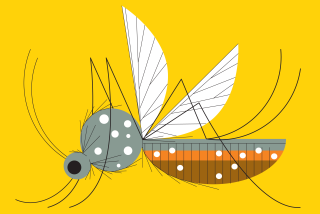Fighting Malaria in Malaysia : Anti-Mosquito Program Uses Humans as Bait
- Share via
KUALA LUMPUR, Malaysia — Munusamy Gunasekaran sleeps on the job, but his boss doesn’t mind.
Gunasekaran is one of 34 volunteers hired by the Health Department to act as “human bait” to attract and catch mosquitoes as part of a program that helps keep this city of 1 million people free of malaria.
The volunteers are paid between $120 and $160 a month to sleep in small huts on a bed surrounded by mosquito netting.
The mosquitoes are attracted by the scent of the people inside the hut and the light from small hurricane lamps hanging by the doors, said Muthuthamby Balakrishnan, a senior assistant in the city’s Public Health Department.
“The man who is acting as the human bait gets up from the bed, comes out of the net and catches the mosquitoes,” Balakrishnan said.
“He shines a powerful torch (flashlight) on the mosquito and for a few moments it does not fly away. The light has this effect on it. He places a test tube over it and traps it,” he said.
In addition, eight “bare-leg catchers” are paid to sit outdoors in various districts of Kuala Lumpur. They roll up their trousers and allow mosquitoes to settle on their legs, where the insects are trapped.
The specimens are sent to the Institute of Medical Research, which determines if any are Anopheles maculaeus mosquitoes, the malaria carriers.
If so, health department officials check the vicinity for any mosquito breeding areas and spray with insecticide, said Balakrishnan, who has been supervising the mosquito control effort for 25 years.
In addition to the people who serve as bait, the city also has mosquito traps scattered around the city. Last year, 34 Anopheles maculaeus mosquitoes were found in eight areas of Kuala Lumpur, he said.
There are no special requirements for being a mosquito catcher, although they have to be in good health for the all-night occupation.
Gunasekaran, 30, says people may joke that he’s being paid to sleep on the job, but actually he is able to nod off only intermittently because “every couple of hours we have to get up, catch the mosquitoes and then lie down.”
Gunasekaran, who is married with two children and works a day job as a gardener, said he traps about 20 to 30 mosquitoes a night, but rarely are any of them the malaria-bearing variety.
He has worked at the job for five years. Some of his colleagues have been at it for more than 25 years.
Catchers work two shifts a night, seven days a week and on holidays. The shifts are from 6 p.m. to midnight, and midnight to 6 a.m.
None of the catchers has caught malaria.
More to Read
Sign up for Essential California
The most important California stories and recommendations in your inbox every morning.
You may occasionally receive promotional content from the Los Angeles Times.










